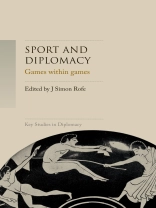The purpose of this book is to critically enhance the appreciation of Diplomacy and Sport in global affairs for both practitioners and scholars. The book will make an important new contribution to at least two distinct fields of study: Diplomacy and Sport, as well as to those concerned with History, Politics, Sociology, and International Relations. The critical analysis the book provides explores the linkages across these fields, particularly in relation to Soft Power and Public Diplomacy. Its conclusions offer avenues for further study based on the future of the relationship between sport and diplomacy. The book has strong international basis: it covers a broad range of countries, their diplomatic relationship with sport and is written by a truly transnational cast of authors. The intense media scrutiny on the Olympic Games, FIFA World Cup, and other international sports will contribute to the global interest in this volume.
Table des matières
Introduction: Establishing the field of play – J. Simon Rofe
Part I: Concepts and History
1. The governance of sport in deeply divided societies: Actors and institutions in Bosnia, Cyprus and Northern Ireland – Laurence Cooley
2. Can sport contribute to the mission success of military Peace Support Operations? – Alexander Cárdenas and Sibylle Lang
3. Diplomatic actors in the world of football (Soccer): Individuals, institutions, ideologies – Alan Tomlinson
4. Mega sports events as political tools: A case study of South Africa’s hosting of the 2010 FIFA Football World Cup – Suzanne Dowse
Part II: Public Diplomacy
5. Contesting independence: Colonial cultures of sport and diplomacy in Afghanistan, 1919-1949 – Maximillian Drephal
6. Friendship is solidarity: The Chinese ping pong team visits Africa in 1962 – Amanda Shuman
7. Barnstorming Frenchmen: The impact of Paris Université Club’s U.S. tours and the individual in sports diplomacy – Lindsay Krasnoff
8. Football, diplomacy and Australia in the Asian century – David Rowe
Part III: ‘No Sport ‘as Diplomacy
9. Boycott and Diplomacy: When the talking stops – Carol Gomez
10. ‘Chinese rings’: The United States, the two Chinas and the 1960 Squaw Valley Winter Olympics – Rachel Vaughan
11. Decentring US sports diplomacy: The 1980 Moscow boycott through contemporary Asian-African perspectives – Joe Eaton
12. They used Americana, all painted and polished, to make the enormous impressions they did: Selling the Reagan Revolution through the 1984 Olympic Games – Umberto Tulli
Conclusion: Post-match recovery and analysis – Aaron Beacom and J. Simon Rofe
Index












